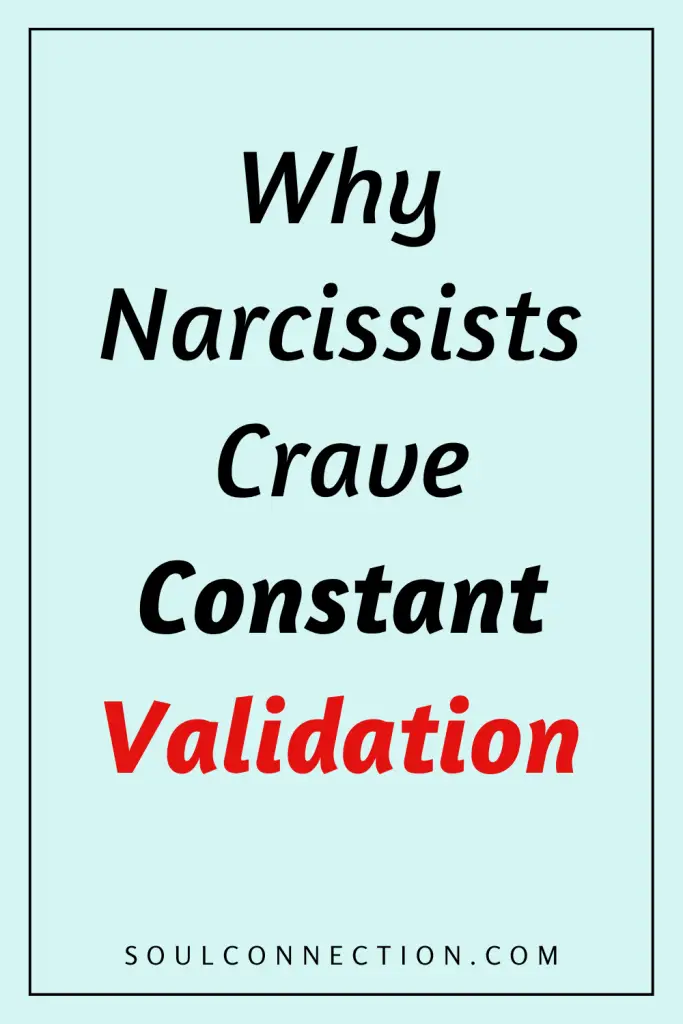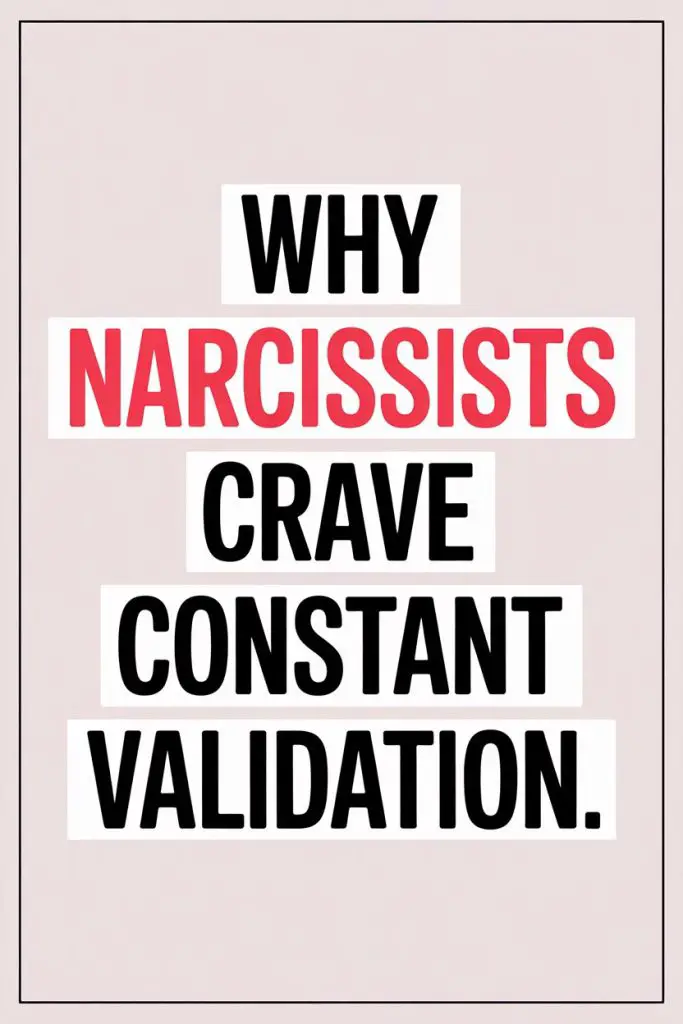Ever noticed how some people need a round of applause just for turning up on time? Or how a partner can turn a minor disagreement into a referendum on their self-worth?
Welcome to the eye-wateringly exhausting universe of narcissistic validation.
This isn’t just about fishing for compliments or loving a little attention. For the narcissist, external praise isn’t a nice-to-have. It’s oxygen.
If you’ve ever wondered why your narcissistic boss, ex, friend, or lover seems to have an insatiable need to be told how wonderful they are, you’re about to get a front-row seat to the emotional mechanics under the hood.
What’s Really Cooking in the Narcissist’s Mind
Let’s clear this up: not every confident person is a narcissist. True narcissists don’t just like a little ego boost—they’re utterly dependent on outside validation to prop up their fragile sense of self.
Deep down, there’s a chasm where healthy self-esteem should be. That’s why the narcissist can’t hold onto praise—it slips right through their fingers.
Compliments only stick for a second, then it’s on to searching for the next hit.
Here’s the twist: most narcissists will never admit this. They might even act like they’re above it all, too cool for school.
Meanwhile, they’re carefully scanning the room for any whiff of criticism or, better yet, adoration.
The Crumbling Foundation of Self-Esteem
Childhood often lays the groundwork for narcissistic traits. Some folks with narcissistic tendencies grew up in environments where love was conditional—maybe only given when they scored a goal or got top marks.
Others were idolized beyond reason, put on a pedestal so high they couldn’t see the ground. Either way, the message lands: self-worth comes from what you do, not who you are.
Fast forward to adulthood, and those old scripts are alive and kicking. Narcissists become experts in sniffing out validation, but genuine self-acceptance? That’s as rare as a unicorn on the Tube.
The Science Bit (But Not the Boring Kind)
Neuroscientists have actually peeked into the brains of narcissists, and the findings are equal parts fascinating and a little sad.
When narcissists receive a compliment, their reward centers light up like Blackpool Illuminations—temporarily.
But the good feeling fades fast, which means they’re soon back on the hunt, scrolling their socials or charming the socks off unsuspecting new acquaintances.
Some psychologists call this “narcissistic supply.” Narcissists treat attention and praise like a bottomless pint at the pub—always thirsty, never satisfied.
Why Relationships Feel Like a One-Way Street
If you’re tangled up with a narcissist, you may feel like the emotional equivalent of a human vending machine.
Give them a compliment? Perfect, you’re doing your job. Forget to notice their new haircut? Brace yourself for a frosty evening—or an emotional explosion.
They don’t just want validation; they expect it, as if it’s their birthright. This isn’t healthy give-and-take. It’s more like a performance review you didn’t sign up for.
Ever try to share your own feelings with a narcissist? You probably noticed their eyes glazing over, followed by a quick pivot right back to their favorite topic: themselves.
Social Media: The Validation Buffet
The modern narcissist’s playground? Social media, hands down. Photos, likes, retweets—each one delivers a tiny squirt of dopamine.
Digital platforms let narcissists curate their image and receive instant feedback. They can broadcast their achievements, show off their holidays, or share their latest thoughts (which, let’s be honest, aren’t always as profound as they think).
If you’re in a relationship with a narcissist, you might notice they care more about what strangers online say than how you feel at home. It’s not you. It’s the addiction to that never-ending validation feed.
When Validation Isn’t Enough
Even the most attentive partners eventually get tired. No amount of reassurance can fill the black hole of a narcissist’s insecurity.
This is where things can get messy. If praise dries up, narcissists might poke or provoke, just to keep the spotlight on themselves.
Arguments, cold shoulders, wild accusations—it’s all grist for the validation mill.
On the flip side, some narcissists swing from charming to cruel in seconds if they sense criticism or indifference. It’s as if any perceived slight is a threat to their very existence.
How Validation-Seeking Shapes Their Behavior
Narcissists are brilliant strategists in the game of self-promotion. They sniff out opportunities to impress, outshine or dominate in conversation.
At work, they take credit for group achievements and somehow always find a way to be the hero. In friendships or romance, they might humblebrag or fish for sympathy, whichever gets the emotional snacks rolling in.
The flip side? The moment someone else shines, the narcissist feels threatened. They’ll either try to outdo them or dismiss the competition entirely.
The Cost to You (and What to Do About It)
Living with, loving, or working beside a narcissist can feel like you’re jogging on a treadmill set to “infinite.” The energy you pour into keeping them happy? It’s rarely reciprocated.
Setting boundaries isn’t mean—it’s vital. Decide what you’re willing to tolerate and what crosses a line. Notice if you’re constantly rearranging your life to avoid upsetting them or to win back their approval.
Offer support, sure—but don’t become their emotional supplier. It’s not your job to fill their endless need for validation.
Spotting the Difference: Healthy Validation Versus Narcissistic Need
Everyone likes to hear “good job” or “you look nice.” That’s normal. Healthy people take compliments and feel good, but they don’t crumble when the applause stops.
Narcissists, on the other hand, treat validation as a lifeline. If you forget to provide it, they act as if you’ve committed a crime against humanity. The mood sours, the blame game begins.
They might even punish you with passive-aggressive silence or melodramatic rants. Recognising this pattern is the first step to protecting your own sanity.
Can Narcissists Change Their Stripes?
The million-dollar question: is growth possible? Therapy can help some narcissists build genuine self-worth, but only if they acknowledge there’s a problem—and that’s a tall order.
Most narcissists would rather blame everyone else. But if you see small signs of self-awareness, all is not lost. Still, don’t hold your breath for a Hollywood-style transformation.
Taking care of yourself is the real win here. Encourage therapy, but keep your own emotional suitcase packed, just in case.
How to Keep Your Sanity Intact
If you’re dealing with a narcissist, you can’t fix them—but you can protect yourself. Here’s what helps:
- Limit how much their approval matters to you.
- Connect with friends and family who see and value you for you.
- Practice saying no without apology.
- Celebrate your own wins, even if no one claps.
The more you build yourself up from the inside, the less you’ll get caught in their endless need for applause.
Learning to Spot the Signs Early
Wish you’d spotted the warning signs sooner? Hindsight’s always 20/20. For the future, trust your gut when you sense that someone’s only interested in their own reflection.
If your compliments are never enough, if criticism (even gentle) turns into drama, or if you feel more like a fan than a partner, it might be time to step back and reassess.
A Different Kind of Love
Loving a narcissist is exhausting, but understanding their need for validation removes some of the mystery. Their charm, their drama, their endless hunger for applause—it’s not about you.
Doesn’t mean you should stick around to be their audience of one.
True connection grows from shared vulnerability, not a standing ovation.
Save your applause for someone who claps for you, too.


